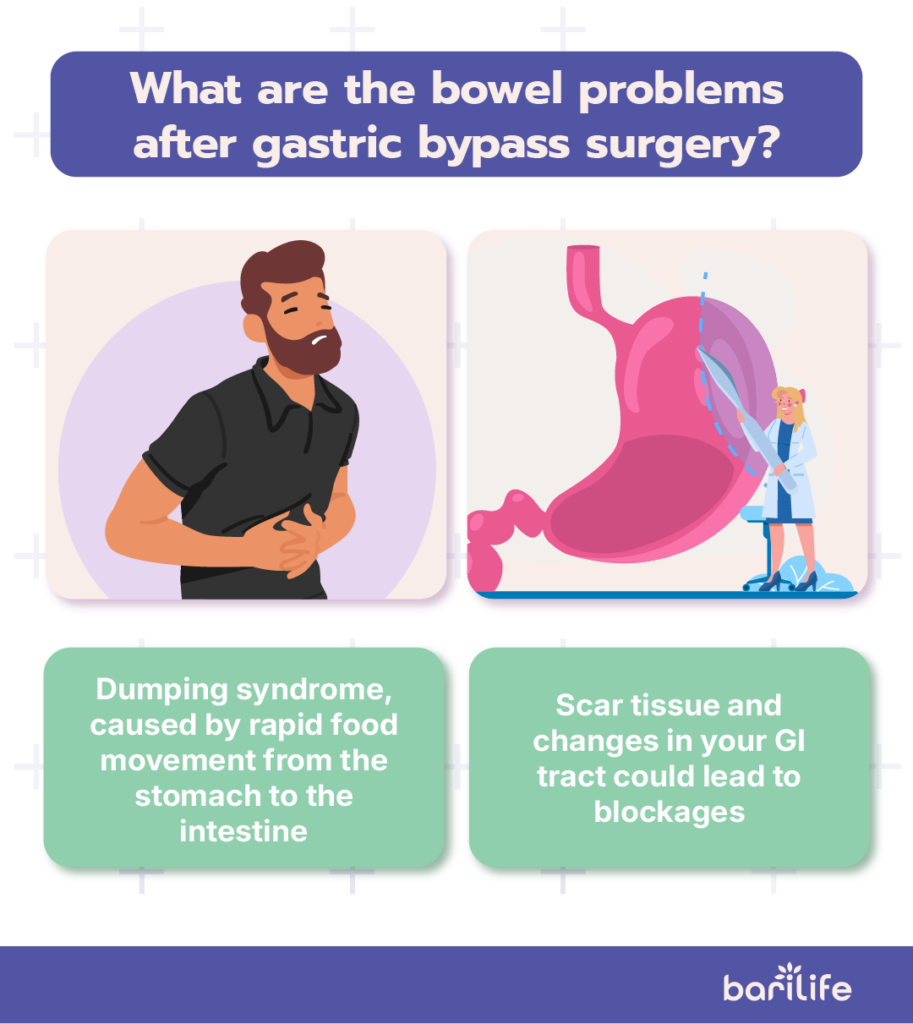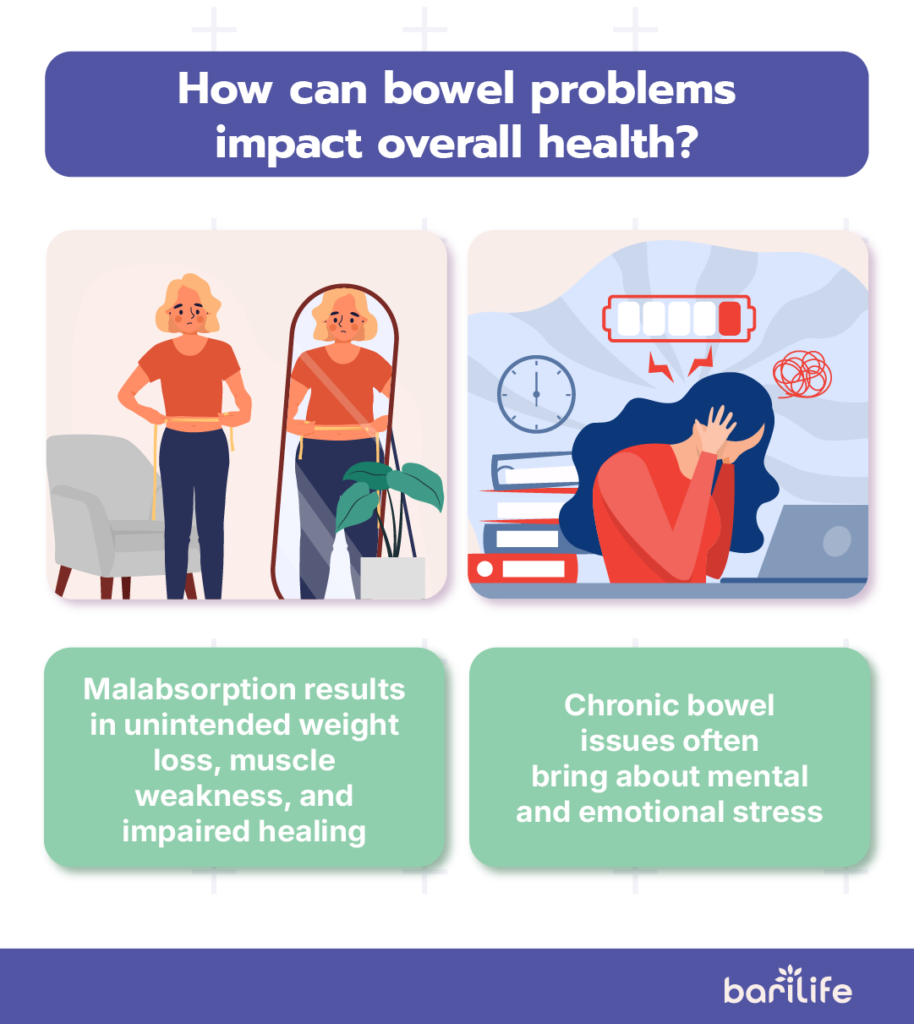While bariatric procedures can help you achieve significant weight loss, there are a few things to be aware of. One of the most common concerns after bariatric surgery is the impact it can have on bowel health. Changes in bowel movements, constipation, and even diarrhea are common after surgery. It’s important to understand the causes, manage symptoms, and know when to seek medical help. In this article, we’ll explore the common bowel problems after bariatric surgery and give advice on how to manage them, including the potential benefits of bariatric vitamins to support digestive health.
What are the bowel problems after gastric bypass surgery?

There are a few types of bowel problems that can happen after gastric bypass surgery. The first is dumping syndrome after bariatric surgery, which usually results from eating sugary foods. This is when food moves too quickly from the stomach into the small intestine. When this occurs, you may run into symptoms like diarrhea, stomach pain and nausea after bariatric surgery. These issues can also impact nutrient absorption, making bariatric multivitamins and bariatric multivitamin with iron supplements essential for preventing deficiencies.
Another problem that could result is malabsorption. This is when nutrients in the food are not as well absorbed into the body. This could lead to diarrhea after bariatric surgery as well as deficiencies in nutrients.
Lastly, the scar tissue and changes in the structure of your GI tract could lead to blockages. While rare, this is very serious and could cause severe pain and constipation after bariatric surgery.
What are common Bowel Problem Complications and Their Causes?
Bariatric surgery requires changes to your digestive tract and as a result there could be some complications that occur. One of the most common problems is constipation. This is often due to dehydration, but can also result from not eating enough fiber. Remember, fiber is found in fruits, veggies, nuts, seeds, and whole grains. After bariatric surgery, it’s common for people to reduce their intake of food altogether, especially fiber-filled foods. Fiber helps to move things along in your digestive tract, so not getting enough can cause your digestion to slow. Certain medications can also contribute to constipation, as they may affect how the digestive system functions.
Alternatively, you may experience diarrhea. This could result from many different things including infections, inflammatory bowel disease, food intolerances, or malabsorption issues. Diarrhea is especially concerning, not only because it’s uncomfortable, but also because it can lead to dehydration and even nutrient loss.
Irritable bowel syndrome (IBS) is a chronic condition that commonly occurs after bariatric surgery. In this condition, you may suffer from both constipation and diarrhea, making it particularly challenging. IBS is often triggered by stress, diet, or gut sensitivity. If you think you may be suffering from irritable bowel syndrome, contact your healthcare provider and work with a dietitian to address your food triggers.

What are the symptoms of bowel problems?
After bariatric surgery, it’s important to keep a watchful eye on your digestive function to monitor for serious bowel problems. Not sure what to search for? Look out for the following symptoms: abdominal pain, changes in stool, bloating, or gas after bariatric surgery.
Stomach pain after surgery is likely because your surgery wounds will be recovering. However, abdominal pain is also common in conditions like IBS, diverticulitis, or even infections. Be mindful of the area of the pain. Surgery sites will be particularly sensitive, but if you are noticing more widespread abdominal pain, you should contact your doctor. While severe cramping is an obvious cause for concern, even mild discomfort could be a sign of a bowel problem and should be addressed by your healthcare provider.
It’s also important to look out for any changes in your stool. Like we’ve mentioned, changes like constipation and diarrhea are common after bariatric surgery. While everyone experiences these symptoms every now and then, persistent symptoms are worth paying attention to. Also, if you see blood or mucus, contact your doctor right away. These could be signs of issues like infections of inflammatory bowel disease.
Lastly, bloating and gas could be signs that you have a bowel problem. A little is normal, but if you are experiencing these symptoms frequently, it’s time to contact your physician. Bloating and gas could be symptoms of IBS, lactose intolerance, or even small intestinal bacterial overgrowth (SIBO).
How can bowel problems impact overall health?
Remember, these bowel problems are not just uncomfortable, they can also be harmful if not quickly addressed. For example, frequent diarrhea can lead to malabsorption of nutrients. If your body is not able to absorb the nutrients from food, you can become deficient. This could lead to many problems like poor immunity, low energy levels, weak bone health, and more.

When your immune system is compromised, you’re more susceptible to infections, which can make daily life challenging and potentially dangerous. Chronic diarrhea and malabsorption can also result in unintended weight loss, muscle weakness, and impaired healing, further complicating recovery.
Beyond the physical implications, chronic bowel issues often bring about mental and emotional stress. Research indicates a strong connection between digestive health and mental well-being, with conditions like IBS being linked to heightened levels of anxiety and stress.
What preventive measures can be taken to avoid bowel problems?
So what can be done to prevent these bowel problems? First, it’s critically important that your diet after bariatric surgery is balanced. This means eating enough protein for proper healing, but also eating a fiber-rich diet. Since you cannot eat as much as you could prior to surgery, this can be a challenge. Make sure to eat fruits, vegetables, whole grains, nuts, or seeds daily in order to keep your digestion moving.
Along the same lines, your body will require enough water to keep everything flowing smoothly. Keep a water bottle near you at all times and try to drink it throughout the day. This will help prevent constipation and ensure you are properly hydrated.
It’s also important to get moving! Exercise helps maintain regular bowel movements, keeping constipation at bay. You don’t need to be an Olympic athlete to see these benefits. Even a simple daily walk will help to encourage proper digestion.
What lifestyle factors contribute to the development of bowel problems?
While bariatric surgery can lead to bowel problems, other lifestyle factors can contribute to them as well. One key factor is a diet high in processed foods. Processed foods are often low in fiber and high in sugar and fat. Without enough fiber, digestion slows, often leading to constipation. At the same time, high sugar and fat content in foods can even irritate the digestive tract, causing bouts of diarrhea. Over time, a diet lacking in fresh, whole foods can make it more challenging for your body to maintain regular bowel movements.

Similarly, if you don’t move your body enough, you may experience a slow digestion. While many Americans suffer from a sedentary lifestyle, this isn’t ideal for our gut health. Physical inactivity can lead to constipation.
Stress and lack of sleep are two additional factors that can have a big impact on bowel health. Stress hormones can disrupt the normal functioning of the digestive tract. This means that stress can have a direct role in the symptoms of conditions like IBS. Additionally, lack of sleep may throw off the balance of gut bacteria and weaken your immune system.
Maintaining bowel health after bariatric surgery is essential to achieving the best outcomes for both your physical and mental well-being. Being proactive by eating a balanced, fiber-rich diet, staying hydrated, and engaging in regular physical activity can help reduce the risk of uncomfortable digestive issues. Recognizing the symptoms of potential bowel problems is also important. Taking these preventive steps will not only aid in your recovery but will also set you on a path toward a healthier, more comfortable life post-surgery.
Conclusion
Maintaining bowel health after bariatric surgery is crucial for ensuring optimal recovery and long-term well-being. Bariatric procedures bring significant lifestyle adjustments that may lead to digestive issues, including constipation, diarrhea, and nutrient malabsorption. Recognizing early signs of these issues, such as abdominal pain, changes in stool, or bloating, allows for timely intervention and can prevent more serious complications.
Preventive measures like adhering to a balanced, fiber-rich diet, staying hydrated, and engaging in regular physical activity support digestive health and mitigate the risks of post-surgery bowel problems. Additionally, incorporating specialized bariatric supplements, such as those from Bari Life, can help meet nutritional needs that may be impacted by altered nutrient absorption. Together, these steps foster both physical and mental resilience, promoting a healthier, more comfortable life post-surgery.

Leave a Comment
Your email address will not be published.